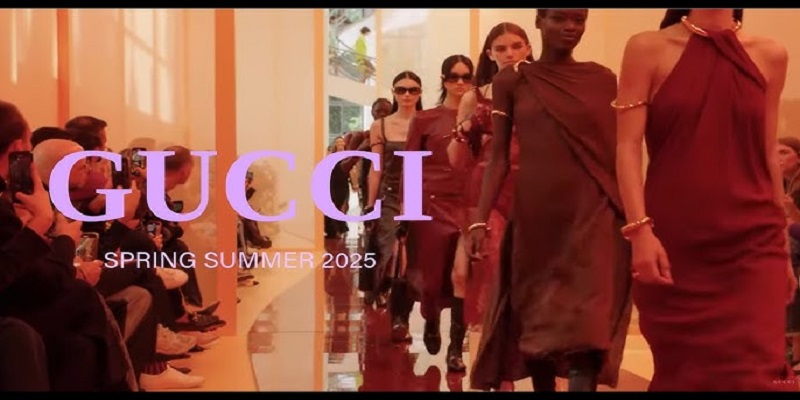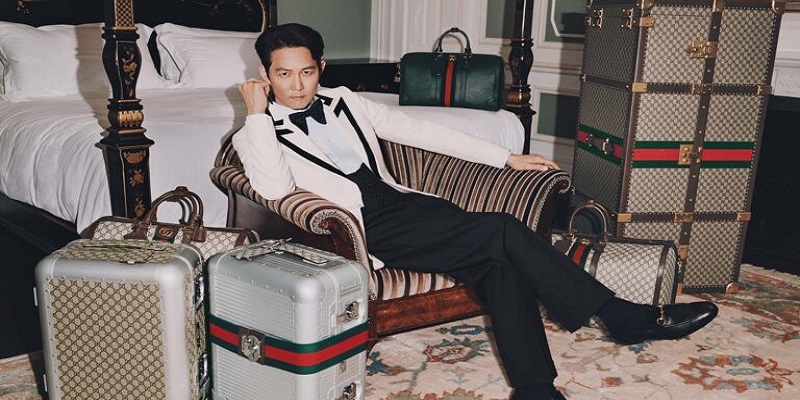Gucci, one of the most iconic names in the world of fashion, has been at the forefront of luxury for nearly a century. Founded in 1921 by Guccio Gucci in Florence, Italy, the brand has evolved from a small leather goods shop to a global powerhouse known for its high-end fashion, accessories, and bold designs. Renowned for its impeccable craftsmanship, innovative designs, and distinctive style, Gucci has captured the hearts of fashion enthusiasts, celebrities, and collectors worldwide.
In this article, we’ll take a deep dive into the history of Gucci, its signature products, its impact on the fashion industry, and why it remains one of the most coveted luxury brands in the world today.
The History of Gucci: From Humble Beginnings to Global Luxury
Guccio Gucci, the founder of the brand, initially worked as a hotel worker in Paris and London before returning to Florence and starting his own company. He opened his first store in 1921, selling luxury leather goods, including handbags, luggage, and shoes. Gucci’s early pieces were inspired by his time working at a hotel, where he was exposed to the elegance and refinement of the wealthy elite.
By the 1950s, Gucci had become synonymous with craftsmanship and luxury. The brand gained a reputation for producing high-quality leather products and had started to gain popularity among the elite of Italy and beyond. The 1950s also marked the launch of the now-iconic green and red stripe, which would become a signature feature of the brand’s designs.

Gucci’s expansion into global markets took place in the 1960s, and by the 1970s, the brand had cemented itself as a symbol of luxury. However, it was not until the 1990s, under the creative direction of Tom Ford, that Gucci underwent a modern transformation, attracting a younger, more diverse audience with its sexy and edgy designs.
Today, Gucci is part of the Kering Group, a multinational corporation that owns several high-end fashion brands. Under the creative leadership of Alessandro Michele, Gucci has flourished, reinventing itself while remaining true to its heritage.
Signature Products: A Blend of Tradition and Innovation
Gucci’s product offerings range from luxurious handbags and shoes to clothing, fragrances, and eyewear. Over the years, the brand has become known for a few key products that are synonymous with its luxury status.
- Gucci Handbags: One of Gucci’s most iconic products is its handbags. The brand’s GG Marmont collection, introduced in 2016, became an instant hit with fashion lovers. The design features the signature GG logo, a chevron pattern, and a soft matelassé leather. The Gucci Dionysus bag, another popular model, takes its name from the Greek god and is recognized for its distinctive tiger-head closure.
- Gucci Sneakers: Over the past decade, Gucci has reinvented the sneaker game. The Gucci Ace and Gucci Rhyton are two of the most sought-after sneaker styles. Both feature the brand’s signature logo and stripes, combining classic Italian craftsmanship with a streetwear edge.
- Gucci Shoes: From polished loafers to platform sandals, Gucci shoes are known for their unique designs and high-quality materials. The horsebit loafer, which debuted in the 1950s, remains one of the brand’s most iconic shoe styles.
- Gucci Apparel: Gucci is also famous for its high-end clothing collections, which mix classic tailoring with modern, avant-garde influences. The brand has redefined luxury fashion by blending bold prints, rich fabrics, and vintage-inspired styles into a new, fresh take on traditional fashion.
- Gucci Fragrances: Gucci’s perfume line is another important facet of the brand. From the floral notes of Gucci Bloom to the woody and musky scents of Gucci Guilty, the brand’s fragrances continue to be highly popular with consumers around the world.

The Evolution of Gucci’s Image: Creativity and Boldness
While Gucci’s history has been rooted in tradition, the brand has always embraced innovation. This spirit of creativity and experimentation has led Gucci to become one of the most relevant and influential brands in contemporary fashion.
Under the creative direction of Alessandro Michele, who took the reins in 2015, Gucci experienced a radical transformation. Michele’s vision was one of inclusivity, playfulness, and maximalism. He combined vintage-inspired elements with bold, modern designs, creating a distinct and refreshing aesthetic for the brand. Michele’s runway shows featured vibrant colors, eclectic prints, and gender-fluid fashion, marking a shift toward a more diverse and experimental approach to fashion.
Michele’s designs often incorporate references to art, history, and pop culture, which resonates with a younger audience seeking individuality and self-expression through fashion. His use of eclectic motifs and reinterpretations of Gucci’s heritage elements has breathed new life into the brand, making it a favorite among influencers, celebrities, and fashion-forward individuals.
Gucci’s Influence on Pop Culture
Gucci has long been synonymous with celebrity culture, and over the years, its pieces have become favorites among A-list stars. Celebrities like Harry Styles, Rihanna, Beyoncé, and Lady Gaga have all been spotted wearing Gucci, which has further solidified the brand’s position as a symbol of luxury, style, and rebellion.
The brand has also embraced collaborations with other luxury and streetwear brands, such as Gucci x The North Face, showing its versatility and ability to blend high fashion with casual, functional wear. Additionally, Gucci’s collaborations with artists and designers have led to exclusive, limited-edition collections that add an element of rarity and exclusivity to the brand.
Gucci’s Commitment to Sustainability
As the fashion industry faces increasing scrutiny over its environmental impact, Gucci has committed to adopting more sustainable practices. In 2018, Gucci launched the Gucci Equilibrium platform, which focuses on creating positive social and environmental impact. The brand has taken steps to reduce its carbon footprint, use eco-friendly materials, and promote ethical manufacturing processes.
Gucci has also embraced the idea of circular fashion, with a focus on recycling and reusing materials to reduce waste. The brand has set ambitious sustainability goals and aims to inspire change within the fashion industry.

Why Gucci Remains One of the Most Coveted Luxury Brands
There are several reasons why Gucci continues to be a global leader in luxury fashion.
- Timeless Craftsmanship: Gucci’s legacy is built on exceptional craftsmanship. Each product is made with care, using high-quality materials, ensuring that every piece is durable and luxurious.
- Innovative Designs: Gucci continues to push the boundaries of fashion by embracing both tradition and innovation. From bold prints to modern silhouettes, the brand consistently delivers fresh, exciting designs.
- Cultural Relevance: Gucci has remained relevant by tapping into the cultural zeitgeist, from celebrity endorsements to collaborations with artists and other brands. Its ability to adapt and innovate has allowed it to stay in the public eye.
- Luxury and Exclusivity: As a luxury brand, Gucci maintains an air of exclusivity that appeals to consumers looking for high-end fashion. The scarcity and prestige associated with owning a Gucci product make it a symbol of status.
Conclusion: Gucci’s Legacy and Future
Gucci’s journey from a small leather goods shop in Florence to a global luxury powerhouse is a testament to the brand’s ability to adapt to changing times while staying true to its roots. With a focus on craftsmanship, innovation, and sustainability, Gucci remains at the forefront of the fashion industry. Under the creative direction of Alessandro Michele, the brand has redefined modern luxury, attracting a new generation of consumers who value individuality, creativity, and authenticity.
As Gucci continues to evolve, one thing remains certain – the brand will always be a symbol of opulence, style, and timeless elegance.
